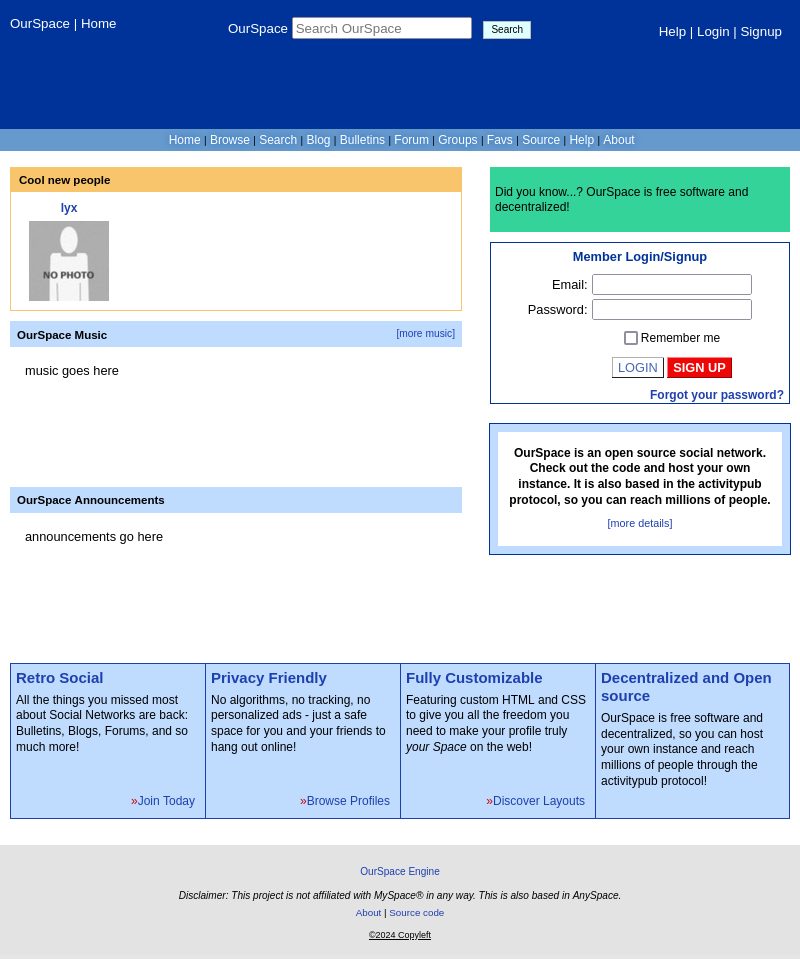OurSpace
A decentralised clone of MySpace based in the ActivityPub protocol.
Table of Contents
About The Project
OurSpace is a decentralised social networking platform inspired by the early concepts of MySpace but built using the ActivityPub protocol for enhanced privacy and interoperability. The goal of OurSpace is to provide users with a space to express themselves, share content, and connect with others in a federated environment that prioritises user privacy and data ownership.
Built With
Getting Started
OurSpace is meant to be easy to set up and run on your own server. Below are the steps to get started with OurSpace.
Prerequisites
To use OurSpace we need to have installed PHP 8.2 or later and Redis. We can install them in a Debian-based system with the following commands:
sudo apt update
sudo apt install nginx mysql-server php php-fpm php-mbstring php-xml php-bcmath php-curl php-redis redis nginx zip unzip composer nodejs npm
Now, enable nginx, mysql and php-fom services:
sudo systemctl enable --now nginx mysql php-fpm redis-server
Create a database for OurSpace:
mysql
CREATE DATABASE ourspace;
CREATE USER 'ourspace_user'@'localhost' IDENTIFIED BY 'password';
GRANT ALL ON ourspace.* TO 'ourspace_user'@'localhost';
FLUSH PRIVILEGES;
EXIT;
Installation
Once you have all the required software installed and the database created, you can proceed to install OurSpace. First, clone the repository:
cd /var/www/html
git clone https://github.com/0xd011f4ce/OurSpace
Now, edit the .env file with your database, redis, and mail credentials. You can copy the .env.example file to .env and edit it with your favourite text editor.
Install all the dependencies:
composer install
npm install
Now, create the key and run the migrations:
php artisan key:generate
php artisan migrate
Build the styles:
npm run build
Give the proper permissions:
chown -R www-data:www-data /var/www/html/OurSpace
chmod -R 755 /var/www/html/OurSpace
Now, create a virtual host for OurSpace. You can create a file in /etc/nginx/sites-available/ourspace.conf with the following content:
server {
listen 80;
server_name ourspace.lat;
root /var/www/html/OurSpace/public;
add_header X-Frame-Options "SAMEORIGIN";
add_header X-XSS-Protection "1; mode=block";
add_header X-Content-Type-Options "nosniff";
index index.html index.htm index.php;
charset utf-8;
location / {
try_files $uri $uri/ /index.php?$query_string;
}
location = /favicon.ico { access_log off; log_not_found off; }
location = /robots.txt { access_log off; log_not_found off; }
error_page 404 /index.php;
location ~ \.php$ {
fastcgi_pass unix:/var/run/php/php8.1-fpm.sock;
fastcgi_index index.php;
fastcgi_param SCRIPT_FILENAME $realpath_root$fastcgi_script_name;
include fastcgi_params;
}
location ~ /\.(?!well-known).* {
deny all;
}
}
And we need another one for serving Laravel Reverb. We can create it in /etc/nginx/sites-available/ws.conf with the following content:
server {
listen 80;
server_name ws.ourspace.lat;
root /var/www/html/ourspace/public;
location /app {
proxy_http_version 1.1;
proxy_set_header Host $http_host;
proxy_set_header Scheme $scheme;
proxy_set_header SERVER_PORT $server_port;
proxy_set_header REMOTE_ADDR $remote_addr;
proxy_set_header X-Forwarded-For $proxy_add_x_forwarded_for;
proxy_set_header Upgrade $http_upgrade;
proxy_set_header Connection "Upgrade";
proxy_read_timeout 300s;
proxy_connect_timeout 75s;
proxy_pass http://127.0.0.1:8080;
}
}
Enable the config:
sudo ln -s /etc/nginx/sites-available/ourspace.conf /etc/nginx/sites-enabled/
sudo ln -s /etc/nginx/sites-available/ws.conf /etc/nginx/sites-enabled/
Restart nginx:
sudo systemctl restart nginx
Now link the storage to the public folder and install the dependencies for reverb:
php artisan storage:link
php artisan install:broadcasting
Now, we need to create two services to handle the jobs that OurSpace needs to run and another one to run Laravel Reverb. So run something emacs /lib/systemd/system/ourspace-queue.service and emacs /lib/systemd/system/ourspace-ws.service and add the following content:
# /lib/systemd/system/ourspace-queue.service
[Unit]
Description=OurSpace queue worker
[Service]
User=www-data
Group=www-data
Restart=on-failure
ExecStart=/usr/bin/php /var/www/html/ourspace/artisan queue:work --daemon --env=production
[Install]
WantedBy=multi-user.target
# /lib/systemd/system/ourspace-ws.service
[Unit]
Description=OurSpace WebSockets Service
[Service]
User=www-data
Group=www-data
Restart=on-failure
ExecStart=/usr/bin/php /var/www/html/ourspace/artisan reverb:start
[Install]
WantedBy=multi-user.target
Now reload the systemd daemon:
sudo systemctl daemon-reload
Finally, enable and start both services, and your OurSpace instance will be ready to be used!
Aditionally, if you want to start multiple instances of the queue workers (which is ideal) you can name the service like /lib/systemd/system/ourspace-queue@.service and you can enable and manage them like this:
sudo systemctl enable ourspace-queue\{1..6} # enables 6 services
sudo systemctl start ourspace-queue\{1..6} # starts 6 services
TODO:
For a list of planned features and improvements, please refer to the TODO file.











